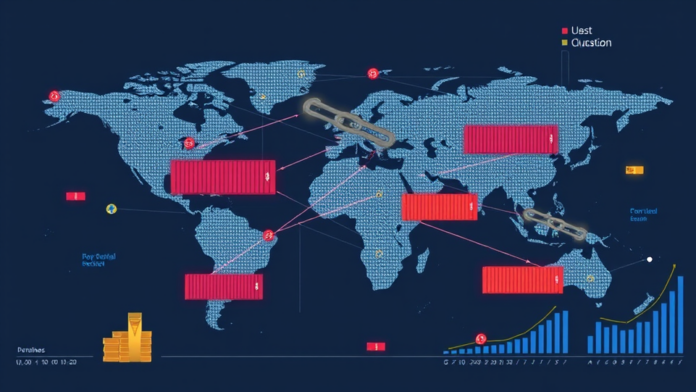Introduction to Global Supply Chain Disruptions
Definition and Overview
Global supply chain disruptions refer to significant interruptions in the flow of goods and services. These disruptions can arise from various factors, including natural disasters, geopolitical tensions, and pandemics. Such events can lead to delays, increased costs, and inventory shortages. Businesses must understand these dynamics to navigate challenges effectively. Awareness is crucial for strategic planning. Companies often face operational hurdles during these disruptions. This can impact their bottom line. Proactive measures are essential for resilience. Adapting to change is vital in today’s market.
Historical Context and Recent Trends
Historically, supply chain disruptions have been influenced by various global events. For instance, the 2008 financial crisis highlighted vulnerabilities in interconnected markets. This led to increased scrutiny of supply chain practices. Companies began to reassess their risk management strategies. A shift towards diversification became evident. Many firms sought to mitigate reliance on single suppliers. Recent trends indicate a growing emphasis on technology integration. Automation and data analytics are now pivotal. Adaptation is essential for competitive advantage.
Causes of Supply strand Disruptions
Natural Disasters and Climate Change
Natural disasters and climate change significantly impact supply chains. These events can disrupt production and transportation. He may face delays in receiving essential materials. Such interruptions can lead to increased costs. Companies must prepare for these challenges. Proactive planning is crucial for resilience. Understanding risks is vital for success.
Geopolitical Tensions and Trade Policies
Geopolitical tensions and trade policies can severely disrupt supply chains. Tariffs and sanctions often lead to increased costs. He may experience delays in product availability. These factors create uncertainty in market dynamics. Companies must adapt to shifting regulations. Strategic planning is essential for navigating complexities. Understanding these influences is crucial for operational efficiency.
Impact on Businesses
Operational Challenges
Operational challenges can significantly affect businesses. Disruptions often lead to inefficiencies in production. He may face increased operational costs. These challenges can hinder customer satisfaction. Companies must reassess their supply chain strategies. Adaptation is key to overcoming obstacles. Understanding these issues is essential for success.
Financial Implications
Financial implications of supply chain disruptions can be profound. Increased costs often arise from delays and inefficiencies. He may experience reduced profit margins. Cash flow issues can also emerge during these times. Companies must evaluate their financial strategies. Effective risk management is essential for stability. Understanding these implications is crucial for informed decision-making.
Sector-Specific Effects
Manufacturing abd Production
Manufacturing and production sectors face unique challenges. Disruptions can lead to significant delays in output. He may struggle with inventory shortages. These issues can increase operational costs. Companies must adapt their processes accordingly. Flexibility is essential for maintaining efficiency. Understanding these effects is vital for success.
Retail and Consumer Goods
Retail and consumer goods sectors are particularly vulnerable to supply chain disruptions. Delays can result in stockouts and lost sales. He may face increased pressure on pricing strategies. These challenges can affect customer loyalty and brand reputation. Companies must enhance their inventory management practices. Proactive measures are essential for maintaining competitiveness. Understanding these dynamics is crucial for effective planning.
Strategies for Mitigating Risks
Diversification of Suppliers
Diversification of suppliers is a critical strategy for mitigating risks. By sourcing from multiple suppliers, he can concentrate dependency on a single source. This approach enhances supply chain resilience. Companies should evaluate potential suppliers based on reliability and performance. Regular assessments are essential for maintaining quality. Additionally, establishing relationships with local suppliers can provide flexibility. Understanding these strategies is vital for effective risk management.
Investment in Technology and Automation
Investment in technology and automation is essential for mitigating risks. Advanced systems can enhance operational efficiency and accuracy. He may reduce labor costs through automation. Implementing data analytics allows for better decision-making. Companies shpuld prioritize scalable solutions for future growth . Regular updates are necessary to maintain competitiveness. Understanding these investments is crucial for long-term success.
Budgeting for Supply Chain Resilience
Allocating Resources Effectively
Allocating resources effectively is vital for supply chain resilience. He must prioritize investments in critical areas. This includes technology, training, and inventory management. A well-structured budget can enhance operational flexibility. Companies should regularly review their financial allocations. Adjustments may be necessary based on market conditions. Understanding these dynamics is essential for sustained performance.
Scenario Planning and Financial Forecasting
Here are 10 trending article titles for a financial website based on the latest news and analytic thinking of financial trends: No input data
Future Outlook and Recommendations
Emerging Trends in Supply Chain Management
Emerging trends in supply chain management indicate a shift towards sustainability. Companies are increasingly adopting eco-friendly practices. He may see a rise in demand for transparency. Advanced technologies like AI and blockchain are becoming essential. These innovations enhance efficiency and traceability. Organizations must invest in training for their workforce. Understanding these trends is crucial for future success.
Long-term Strategies for Business Sustainability
Long-term strategies for business sustainability focus on resilience and adaptability. Companies should prioritize sustainable sourcing and production methods. He may benefit from investing in renewable energy. Diversifying product lines can also enhance market stability. Regular assessments of environmental impact are essential. Understanding these strategies is vital for growth.

